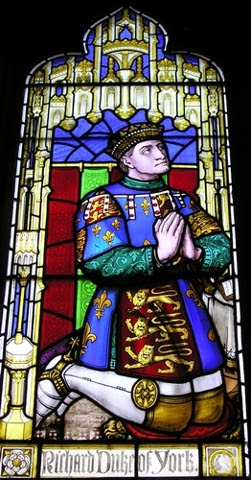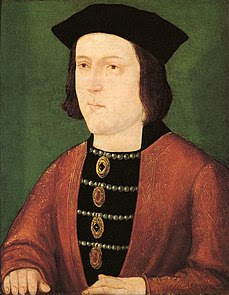RICHARD OF YORK, CLAIMANT TO THE ENGLISH THRONE
AND ONE OF THE MAIN LEADERS OF THE WAR OF ROSES
[HISTORICAL IMAGE]

_________________________________________
EDMUND BEAUFORT, 2ND DUKE OF SOMERSET, THE GREAT RIVAL
OF RICHARD, DUKE OF YORK
HISTORICAL FICTION
KING EDWARD IV, SON OF RICHARD, DUKE OF
YORK
HISTORICAL IMAGE
KING EDWARD IV, SON OF RICHARD, DUKE OF
YORK
HISTORICAL FICTION

RICHARD NEVILLE, 16TH EARL OF WARWICK, THE KINGMAKER
COUSIN TO EDWARD IV, FIRST ALLY TO HIS FATHER, RICHARD,
DUKE OF YORK, THEN TO KING EDWARD IV
LATER THEY BECAME ADVERSARIES AND THE KINGMAKER TURNED
TO MARGARET OF ANJOU [BECOMING A ”LANCASTRIAN] TO RESTORE HENRY VI TO THE THRONE
HE FAILED AND LOST HIS LIFE IN THE BATTLE OF TEWKESBURY
HIS DAUGHTER, ANNE, LATER BECAME QUEEN OF ENGLAND,
MARRIED TO KING RICHARD III [BROTHER TO KING EDWARD IV]
[FICTION]
KING HENRY VI OF ENGLAND
[HISTORICAL IMAGE]
MARGARET OF ANJOU, QUEEN OF ENGLAND
MARGARET OF ANJOU, QUEEN OF ENGLAND
[HISTORICAL IMAGE]

TWO IMAGES OF MARGARET OF ANJOU, QUEEN OF ENGLAND
[FICTION]
ENMITY BETWEEN MARGARET OF ANJOU AND RICHARD, DUKE OF YORK/
AFTER THE BATTLE OF WAKEFIELD/MANIFESTO OF MARGARET OF
ANJOU TO THE CITIZENS OF LONDON IN 1461
I proudly present one of the rare documents I found in which
Queen MargaretIt is to be read in a
Manifesto she proclaimed to the citizens
See the text of the Manifesto below
But first:
BACKGROUND
I invite you to travel with me to the past again, this time to the
great blow to the Yorkist cause.
In contrary to popular belief, Margaret of Anjou did not order their executions
But after all, it IS possible, that before her departure
to Scotland, Margaret ordered that if York and his main supporters
were captured alive, they should be killed.
However, she was NOT at the battlefield giving those orders.
There are strange stories anyway:
One source mentions Margaret of Anjou outside the Sandal Castle
Wakefield], raving and screaming to the Duke of York to come out
and fight with her.
To give you a good laugh I quote this ridiculous story:
Now it’s nonsense, since Margaret was not at Wakefield at all, but
even if she were, it’s my
belief, that no Medieval Queen would forget her dignity like that.
Assuming there was really such a big hatred amongst them,
I have always wondered, what the real cause was.
Of course I know the historical facts, stemming directly from
that as the only explanation of such a bitterness.
I will refer to that in a later article.
Anyway, when York was slain, Margaret came back from Scotland
withAlthough they did, they were not the only ones.
Fictional novel author Susan Higginbotham shows convincingly,
However, by personal experience and popular belief, the people
feared those Scottish soldiers, as Margaret progressed through England.
At first she was succesful and defeated [I mean, her commanders]
the EarlEdward of March, the eldest son of the late Duke of York, turning out
to be a great military commander, was occupied elsewhere, defeating
Anyway, Margaret marched to London, trying to get in the capital.
However, the Londoners were hesitant, fearing looting and plundering.
Therefore she proclaimed a Manifesto, assuring them that no one
would be harmed.
I find it that interesting, since she refers to the death of the
Duke of York.
We know the aftermath
Edward, the 7th Earl of March, son of the late Duke of York, reunited with
the Earl of Warwick, came with a vengeance and after having succesfull
Margaret’s son, the prince of Wales, was slain at the
battle ofA tragic life.
The Manifesto of Margaret of Anjou to the citizens of London is a very interesting document
casting a glance on the strong-willed, courageous and hard personality
See the document below
Thanks for travelling with me to the past again
Astrid Essed
LETTER XXXVIII.
Margaret of Anjou^ Queen of Henry F/., to the
Citizens of London, a. d. 146 1 .
[haul. MS, NO. 543, FOL. 147.]
%* Hie following letter, or manifesto, needs UtOe comment ; it is
one of the few productions of the high-spirited Margaret of Anjou
now in existence. It was penned early in 1461 ; when, after the
battle of Wakefield, which cost the Duke of York his life, the queen
advanced towards London to secure the capitAl. It was addressed to^
the citizens of London, where the king was then residing, and its
object was to secure, by fair promises, their fiivourable reception of
hbrself and her troops, which 'were composed of an odd medley of
EnglJsh» Scotch, Iri8h» and Welah» into^ the city. The eloquence of
the queen proved unsuccessful, however. Hie Londoners, fearing the
presence of such tumultuous, guests, chose to reinforce the army of the
Barl of Warwick, and throw their powerful influence into the scale of
Digitized by VjOOQ IC
96 LETTERS OF ROYAL AND
iht Yorkists. Their determined enmity kept the queen at bay till the
Earl of March (afterwards Edward IV.) joined his troops to those of
the Earl of Warwick, and rendered her entrance into London impos-
sible. The unfortunate Queen Margaret was destined never again to
enter the capital of that kingdom which she had long ruled with so
despotic a sway.
Right trusty and well-beloved, we greet you
heartily well.
And whereas the late Duke of N. [York] of
extreme malice, long hid under colours, imagined
by divers and many ways and means the de-
struction of my lord's good grace, whom God of
his mercy ever preserve, hath now late, upon an
untrue pretence, feigned a title to my lord's crown,
and royal estate, and pre-eminence, contrary to his
allegiance and divers solemn oaths of his own offer
made, uncompelled or constrained, and fully pro-
posed to have deposed him of his regality, ne had been
(had it not been for) the sad (&rm)y unchangeable
and true dispositions of you and others, his true
liegemen, for the which your worshipful dispositions
we thank you as heartily as we can. And howbeit,
that the same untrue, unsad, and unadvised person,
of very pure malice, disposed to continue in his
cruelness, to the utterest undoing, if he might, of us,
and of my lord's son and ours the prince, which,
with God's mercy, he shall not be of power to
perform, by the help of you and all other my lord's
faithful disposed subjects, hath thrown among you,
as we be certainly informed, divers untrue and
Digitized by VjOOQ IC
feigned matters and surmises ; and in especial, that
Yfe and my Iord*s said son and ours should newly
draw toward you with an unseen power of strangers,
disposed to rob and to despoil you of your goods and
havings (property) ; we will that you know for certain
that, at such time as we or our said son shall be
disposed to see my lord, as our duty is and so binds
us to do, you, nor none of you, shall be robbed,
despoiled, nor wronged by any person that at that
time we or our said son shall be accompanied with, or
any other sent in our or his name, praying you, in
our most hearty and desirous wise, that [above] all
earthly things you will diligently intend (attend) to
the surety of my lord's royal person in the mean
time; so that through malice of his said enemy he
be no more troubled, vexed, nor jeoparded. And, so
doing, we shall be unto you such lady as of reason
you shall be largely content. Given under our
signet, &c.






.jpg)


